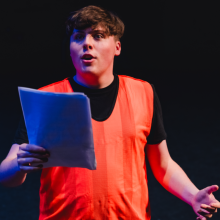Sharon Hurley Hall (she/her) is an author, educator and anti-racism activist. A former journalist and writer with more than 30 years’ experience, Sharon is also the author of 'I'm Tired of Racism: True Stories of Existing While Black' and 'Exploring Shadeism'. Sharon is a powerful voice in the anti-racism space, launching several significant initiatives that have sparked important conversations about racial equity and inclusion. Her newsletter, Sharon’s Anti-Racism Newsletter, has become a trusted resource for thousands of subscribers seeking to understand and combat systemic racism. Through this platform, she shares personal insights, curated resources, and actionable strategies for anti-racism work in professional and personal contexts. Her most recent social justice initiative is the SHHARE anti-racism membership community, which she founded in late 2024.
Identity beyond the labels
The names we use to indicate identity have power - the power to heal and the power to harm, the power to unite and the power to divide, the power to uplift and the power to tear down. And yet, it's something we rarely think about, going along unquestioningly with the latest iteration of official alphabet soup. But language is ever-evolving, and even the terminology we grew up with may not land the same way with audiences we serve. Here's an insight into this.
Let's Talk About "Minorities"
As a Black woman, the term “minority” or “minority ethnic” is problematic. The judgement embedded in those labels don't match reality. They feel like an attempt to minimise or dismiss my presence and capability - it's all in the etymology, really. Anything minor is seen as lesser, and who wants to feel like that? Plus a lot of systemically racist institutions use that terminology to discriminate.
Here's one fact: while Black and Brown people may be a statistical minority in particular locations, we are not a statistical minority on a global scale. So why do we accept that label and framing, which treats the demographics of white majority countries as universal?
It's more accurate to say that we've been minoritised - treated as a minority with all the systemic marginalisation that implies. Or, to borrow the term coined by Rosemary Campbell-Stephens, we are “people of the global majority”. If everyone thought that way, issues like ending racism and discrimination might seem more important, don't you think?
Outdated Terms
Most people will agree that the N-word (no, I won't write it out, say it or attempt to reclaim it) is not acceptable (despite those trying to bring hatred back). But that aside, there are other terms that pop up across the generations. If you're dealing with a group with mixed ages and heritages, some people still refer to Black and Brown people as "coloured". Many of us dislike that because of the association with terms used during enslavement, and apartheid. And it raises the question: "coloured" in relation to what? Because behind that term is the idea that whiteness is the default, everything else is a departure from the norm. You can see why that's problematic, can't you?
We should also consign the term BAME (Black, Asian, Minority Ethnic) to the garbage bin of history. Like its cousins BME (Black and Minority Ethnic), POC (People of Colour), BIPOC (Black, Indigenous, People of Colour), it tends to result in the erasure of individual heritage, identity and culture. Your clients of Bangladeshi heritage won't have had the same experiences as those with Caribbean heritage, for example. Seeing all people who aren't racialised as white as a homogeneous group makes it difficult to give people the individual focus they sometimes need. Blanket approaches aren't it!
What About Polycultural Folks?
My good friend Erin Corine Johnson has been talking about polycultural as a way to encapsulate multiple identities. It's a word I like a lot. Terminology I see as problematic for people with multiple heritages includes "mixed" which makes people sound like a cake. Plus, if you go far back enough isn't everyone a mix of ancestry? Some favour biracial or multiracial, which only works if you accept the fiction of "race" in the first place. For the same reason, I dislike the term racialised when it's used only for people with brown skin, because since "race" is invented we are ALL racialised, including white folks.
Just Call Me Black, But ...
My personal preference is to be called Black. I was a Black baby, a Black girl, and now a Black woman. I'm not a POC, BIPOC or BAME. I am racialised as Black, just as many of you are racialised as white, and in some countries I am also minoritised.
The caveat is that this is a personal decision for many. Some people just go along with the status quo and don't mind; others do mind a lot. So if you're working with people it's best to find out the words they use for their identity and use those - and those only.
Plus people of African heritage are often only seen as Black once they leave the continent and may instead identify with their country or other cultural identity.
A note about Black Americans. Some people use the term African-American, some don't. But remember Black people in the US come from all over the world, so it's wiser not to assume.
How I Handle Naming - and How You Could Too
My one line advice on this issue is say what you mean. When I'm talking about Black and Brown people on a global scale, I use People of the Global Majority. Specificity matters even more when discussing particular communities. It matters for policies and general human kindness whether I'm discussing different Black communities, different South Asian or East Asian communities, different Latin communities, different Indigenous communities. None of those is a monolith, and individuals deserve to have their identities recognised and honoured by the names we choose to use.
Those common blanket labels hide vastly different cultural and personal experiences. If you're committed to anti-racism, then you can avoid many missteps by looking beyond labels, hearing individual stories and learning when a particular term is right to use, and when it’s not.
Language has the power to honour people's identities or to erase them. Choose the words that offer respect and dignity.



